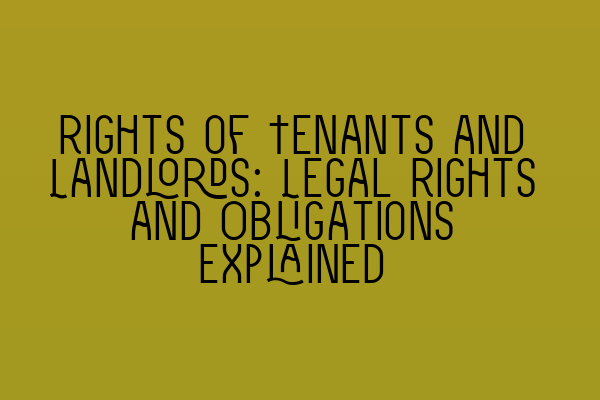Rights of Tenants and Landlords: Legal Rights and Obligations Explained
As a solicitor specializing in property law and land law at SQE Property Law & Land Law, I often come across clients who are unsure about their rights and obligations as tenants or landlords. It is crucial to understand the legal framework surrounding tenancy agreements to ensure a smooth and fair relationship between both parties.
In this blog post, I will provide you with a comprehensive guide to the rights and obligations of tenants and landlords, empowering you with the knowledge required to navigate the complex world of property law.
Rights and Obligations of Tenants
1. Right to a Safe and Habitable Property:
Tenants have the right to expect a safe and habitable living environment. Landlords are legally obligated to ensure that the property meets certain health and safety standards, such as providing adequate heating, plumbing, and electrical systems. If the property falls below these standards, tenants have the right to request repairs or withhold rent until the issues are resolved.
2. Right to Quiet Enjoyment:
Tenants have the right to enjoy their rented property without undue interference from the landlord. Landlords must respect their tenants’ privacy and should not enter the property without prior notice, except in cases of emergency. If a landlord repeatedly violates a tenant’s right to quiet enjoyment, the tenant may have grounds to terminate the tenancy agreement.
3. Right to a Written Tenancy Agreement:
A written tenancy agreement provides clarity and protection for both tenants and landlords. It should outline key terms such as the duration of the tenancy, rent payment details, and any specific rules or restrictions. Tenants have the right to request a written tenancy agreement, and landlords must provide one within a reasonable timeframe.
4. Obligation to Pay Rent:
Tenants are obligated to pay rent in accordance with the terms of their tenancy agreement. Failure to pay rent can result in legal action, including eviction. It is essential for tenants to budget and prioritize their rent payments to maintain a positive relationship with their landlord.
5. Obligation to Maintain the Property:
While landlords are responsible for major repairs and maintenance, tenants have an obligation to keep the property in a reasonably clean and well-maintained condition. This includes routine cleaning, addressing minor repairs, and reporting any significant issues to the landlord in a timely manner.
Understanding the rights and obligations of landlords is equally important for a fair and harmonious landlord-tenant relationship.
Rights and Obligations of Landlords
1. Right to Receive Rent Payments:
Landlords have the right to receive rent payments on time as specified in the tenancy agreement. If a tenant fails to pay rent, the landlord can take legal action to recover the unpaid rent or seek eviction.
2. Right to Set Reasonable Rules and Restrictions:
Landlords have the right to set reasonable rules and restrictions for their property. These may include guidelines on noise levels, pet ownership, and use of common areas. However, landlords must ensure that these rules do not infringe upon the tenant’s rights or discriminate against protected characteristics.
3. Obligation to Maintain the Property:
Landlords are responsible for maintaining the structure and major systems of the property, including repairs to the roof, plumbing, and electrical systems. They must address maintenance issues promptly to ensure the property remains safe and habitable for tenants.
4. Obligation to Protect the Tenant’s Deposit:
If a landlord requests a deposit from the tenant, they have a legal obligation to protect the deposit in a government-approved deposit protection scheme. This scheme ensures that the deposit is returned to the tenant at the end of the tenancy, minus any legitimate deductions.
5. Obligation to Provide Notice for Tenancy Termination:
If a landlord wishes to terminate a tenancy, they must provide proper notice to the tenant as specified by the relevant tenancy agreement or legislation. Landlords cannot evict tenants without following the proper legal procedures.
As a tenant or landlord, it is crucial to understand and adhere to these rights and obligations to ensure a fair and lawful tenancy agreement. If you require further assistance or advice regarding your specific situation, do not hesitate to contact SQE Property Law & Land Law.
To further enhance your knowledge of property law and land law, consider exploring our related articles and resources:
– SQE 1 Practice Exam Questions: Test your knowledge and prepare for the SQE 1 examination with our comprehensive practice exam questions.
– SQE 1 Practice Mocks FLK1 FLK2: Get hands-on experience and test your skills with our SQE 1 practice mocks.
– SQE 2 Preparation Courses: Prepare for the SQE 2 examination with our tailored preparation courses.
– SQE 1 Preparation Courses: Gain a solid foundation in property law and land law with our SQE 1 preparation courses.
– SRA SQE Exam Dates: Stay updated with the latest SQE examination dates and deadlines set by the Solicitors Regulation Authority.
I hope this blog post has provided you with valuable insights into the rights and obligations of tenants and landlords. Remember, it is always beneficial to seek professional legal advice to address any specific concerns or issues you may have.
